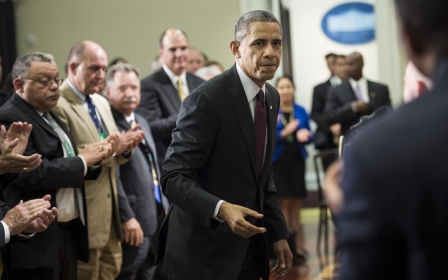US confident of broad coalition against IS, rules out Iran partnership

US President Barack Obama said on Friday he is confident he can gather a broad international coalition to defeat militants in Iraq and Syria who dub themselves Islamic State.
His confirmation came in a speech given after two days of talks at the NATO summit in Wales.
"I leave here confident that NATO allies and partners are prepared to join in a broad, international coalition," Obama said after a meeting of the Western military alliance.
Obama cautioned that "it's not going to happen overnight", but "we're going to achieve our goal.
"We're going to degrade and ultimately defeat ISIL (IS's previous name) the same way we've gone after al-Qaeda," he said.
US Secretary of State John Kerry will travel to the Middle East to seek the support of regional powers, Obama said, insisting that Arab involvement was "absolutely critical.”
The president added: "Our hope is the Iraqi government is actually formed and finalised next week. That, then, allows us to work with them on a broader strategy."
Though Obama stressed the importance of building a broad coalition to defeat militants, Washington later ruled out any possibility of co-operating with Iran on the issue.
Kerry on Friday co-chaired with Britain a meeting of ministers from Australia, Canada, Denmark, France, Germany, Italy, Poland and Turkey in a bid to win support for the fight against IS.
'Time, patience and resolve'
The US has conducted more than 100 air strikes in northern Iraq in recent weeks, allowing Kurdish and Iraqi forces to regain ground lost to the jihadists.
Other countries have provided humanitarian assistance and intelligence, while Germany and France are providing military equipment to Kurdish fighters battling IS in northern Iraq.
Kerry stressed Friday that there would be "no boots on the ground" in the US strategy against IS, but added that "there are many ways in which we can train, advise, assist, and equip.”
In his speech on Friday Obama echoed these sentiments, also saying that there would be no US troops on the ground in Syria.
Instead, he said the US would support “effective partners” to combat IS in the region.
European allies, while supportive of the US initiative, are proceeding with caution.
Britain has left the door open to air strikes in Iraq, but Prime Minister David Cameron played down the prospect of any immediate action.
"This will take time, patience and resolve," he told reporters at the end of the summit.
"We will proceed carefully and methodically, drawing together the partners we need, above all in the region, to implement a comprehensive plan."
President Francois Hollande said France was ready to join a coalition against IS militants in Iraq, but warned it would not commit to actions in Syria that might aid President Bashar al-Assad.
German Foreign Minister Frank-Walter Steinmeier stressed the effort was at an early stage.
"We are at the beginning in dealing with a group which nobody has a strategy to deal with in the long run," he told reporters.
'Barbaric, despicable acts'
NATO Secretary General Anders Fogh Rasmussen said the military alliance was willing to help if there was a request from Baghdad.
The support would likely come in the form of training and coordination with other countries' efforts against IS.
Rasmussen said he "warmly welcomed" efforts by the US and its allies, adding: "I think the international community has an obligation to do all it can to stop this dangerous terrorist organisation."
He said NATO nations had also agreed to exchange more information on foreign fighters returning from Iraq and Syria to Europe and the United States, due to fears they will carry out attacks on home soil.
Mentioning the execution by beheading of two US journalists by IS, Cameron said NATO leaders were "united in condemnation of these barbaric and despicable acts.”
In a further reminder of the brutality in Iraq, Iraqi Kurdish forces and Shiite militiamen on Friday discovered mass graves containing 35 bodies after retaking the town of Sulaiman Bek from militants.
Stay informed with MEE's newsletters
Sign up to get the latest alerts, insights and analysis, starting with Turkey Unpacked
Middle East Eye delivers independent and unrivalled coverage and analysis of the Middle East, North Africa and beyond. To learn more about republishing this content and the associated fees, please fill out this form. More about MEE can be found here.




